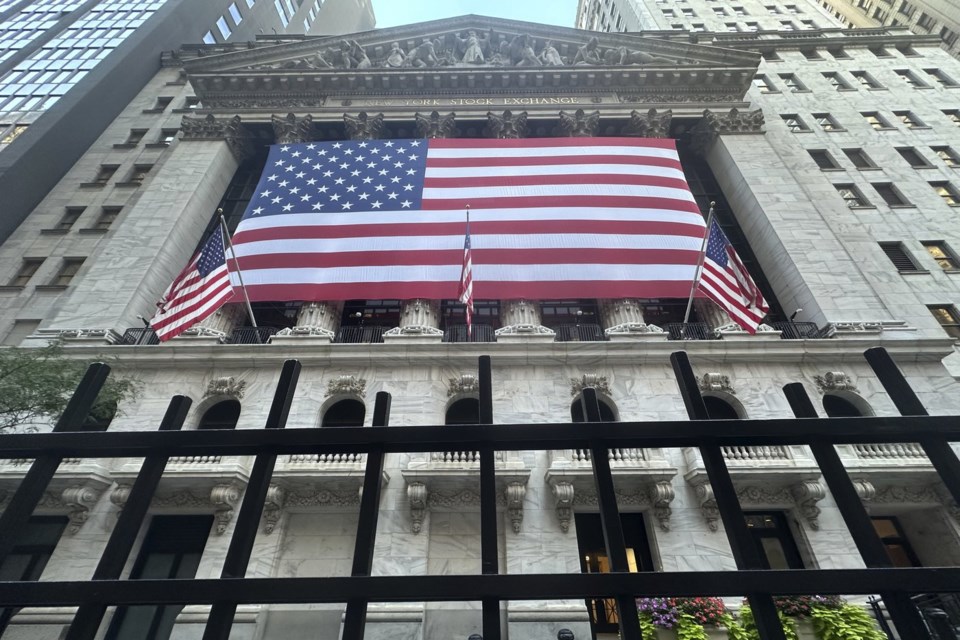NEW YORK (AP) — U.S. stocks drifted to a mixed close following several weeks of sharp swings. The S&P 500 rose 0.4% higher Tuesday. The Dow Jones Industrial Average slipped 0.2%, and the Nasdaq composite rose 0.8%. Oracle jumped to help lead the market after delivering better profit and revenue for the latest quarter than analysts expected. Gains for several influential Big Tech stocks also helped. They offset drops for banks following several discouraging comments from executives at an industry conference. JPMorgan Chase dropped after warning that analysts’ expectations for an underlying measure of profit may be too high. Crude oil prices continued to tumble.
THIS IS A BREAKING NEWS UPDATE. AP’s earlier story follows below.
NEW YORK (AP) — U.S. stocks are drifting in mixed trading Tuesday following several weeks of sharp swings.
The S&P 500 was 0.3% higher in late trading. It flipped between small gains and losses through the day, but the moves were nothing like its careenssince setting a record in July amid worries about the slowing U.S. economy and whether coming cuts to interest rates will keep it out of a possible recession.
The Dow Jones Industrial Average was down 116 points, or 0.3%, with less than an hour remaining in trading, and the Nasdaq composite was 0.7% higher.
Oracle jumped 11.2% to help lead the market after delivering better profit and revenue for the latest quarter than analysts expected. Gains for several influential Big Tech stocks also helped to drive indexes, including rises of 1.6% for Microsoft and 2.7% for Amazon.
But banks were offsetting the gains following discouraging comments from several executives at an industry conference.
JPMorgan Chase fell 5.1% after its chief operating officer said analysts’ expectations for an underlying measure of profit may be “too high.” Goldman Sachs dropped 4.3% after its chief executive said its trading revenue for the current quarter is trending down 10% at the moment. And Ally Financial sank 16.8% after its chief financial officer warned borrowers are “struggling with a high inflation and cost of living and now, more recently, a weakening employment picture.”
Stocks of energy producers were also weak after oil prices fell. A barrel of Brent crude, the international standard, is near its lowest price since 2021, and it's been sinking amid worries about how much fuel a fragile global economy will burn. That helped drag Exxon Mobil down 3.7% and Chevron down 1.8%.
In the bond market, Treasury yields eased. The yield on the 10-year Treasury fell to 3.64% from 3.70% late Monday.
Like stocks, Treasury yields have been swinging sharply ahead of the Federal Reserve’s meeting next week, where the widespread expectation is for it to cut its main interest rate for the first time since the COVID crash of 2020.
The Fed is turning its focus away from stifling high inflation and toward protecting the economy. The debate on Wall Street is now focused on how much the Fed will cut the federal funds rate, which has been sitting at a two-decade high, and whether the easing will ultimately prove to be too late to prevent a recession.
Reports coming on Wednesday and Thursday on inflation could influence the size of the Fed’s upcoming cuts. The worst case for the Fed would be if inflation were to reaccelerate when the job market looks fragile, because helping either of those would require opposing moves.
On Wednesday, though, economists expect the latest report on inflation to show prices for U.S. consumers were 2.6% higher in August than a year earlier. That would be a slowdown from July’s inflation rate of 2.9%
Ahead of that will be Tuesday evening’s debate between Vice President Kamala Harris and former President Donald Trump. Foreign-exchange strategists at Bank of America say it could be the next catalyst for the market.
The value of the U.S. dollar has increased against peers in the past when expectations for a Trump re-election have strengthened, among other moves that have come to be known as part of the “Trump trade,” due in part to his calling for tariffs. But economists are debating what impact either candidate’s proposed policies would ultimately have on the economy, and the bigger deal may be whether one party is able to sweep into control of both Congress and the White House.
For as much attention as the presidential debate is getting, the “market moving implications are almost nonexistent,” according to Julian Emanuel and other strategists at Evercore ISI.
Strategists at Wells Fargo Investment Institute are looking for gridlock to continue, with neither party getting big enough majorities to pass transformative legislation. Because of that, “we think the economy is much more likely to move markets than elections,” said Paul Christopher, head of global investment strategy, and Jennifer Timmerman, investment strategy analyst.
In stock markets abroad, indexes slipped in Europe after finishing mixed in Asia. Stocks rose 0.2% in Hong Kong and 0.3% in Shanghai after China’s customs office reported the country’s exports grew for a fifth consecutive month, in a sign of growing demand abroad.
___
AP Business Writers Matt Ott and Yuri Kageyama contributed.
Stan Choe, The Associated Press




